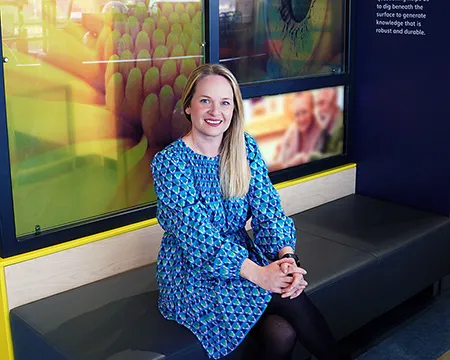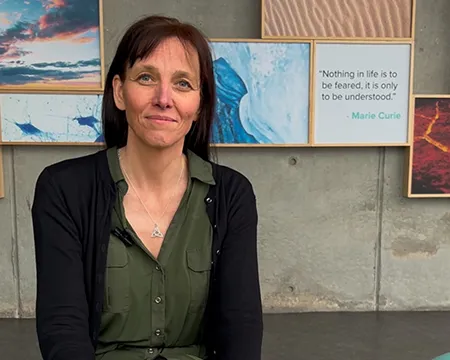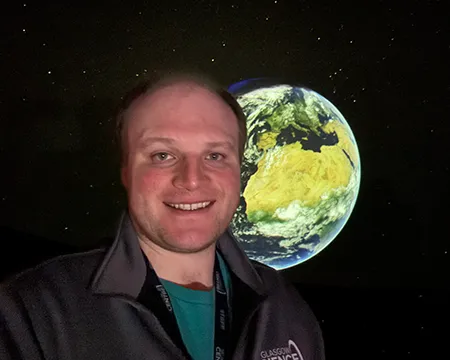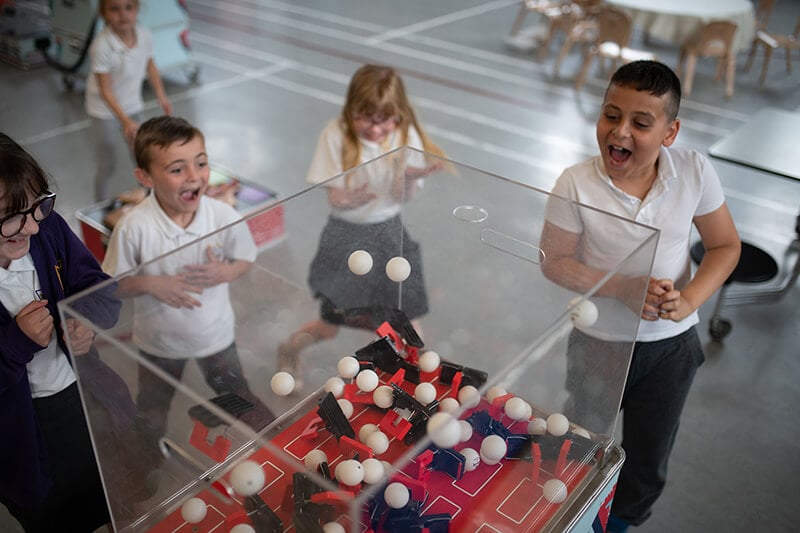Workforce of the Future make a promise to Planet Earth at the launch of the Newton Flight Academy
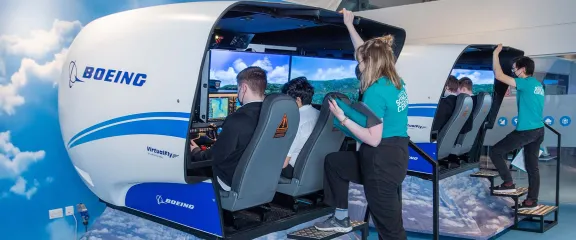
As Glasgow Science Centre opens the doors to its new state-of-the-art Newton Flight Academy, secondary pupils have today (29 March 2022) set out a promise to the planet as they look to live greener and more sustainable lives.
Pupils from King’s Park Secondary School made a commitment to use their creativity and curiosity to protect the planet’s natural resources.
The Newton Flight Academy is the latest instalment to be housed at Glasgow Science Centre and will be a permanent classroom used to teach students aviation-related STEM concepts; inspiring engineers and scientists of tomorrow to develop the ideas and technologies that will shape the future of more sustainable aircraft and aviation.
Developed in partnership with FIRST Scandinavia, made possible through an investment from Boeing, and supported by University of Strathclyde and Mathworks, the Academy hosts three full-motion flight simulators. It is the first Newton Flight Academy to open in the UK and will work in close partnership with the Science Skills Academy in the Highlands and Islands, which has been operating Newton Rooms since 2019.
Originally developed in Norway, the Newton Concept aims to provide high-quality and unique learning experiences for young people all over the world. With nearly 50 Newton Rooms operating today, students are gaining the 21st-century skills they need through curriculum-based practical learning, with this new development at the Glasgow Science Centre one of only two Newton Flight Academies worldwide with the other based in Norway.
The Academy will cover themes including space, biofuels, and advanced materials and manufacturing, and will provide immersive and experiential learning programmes that will enable S2 and S3 pupils across Scotland to engage in real-world challenges while working alongside industry professionals.
Some of those S2 and S3 pupils have now said that those who go on to jobs in science, technology, engineering and mathematics will be “bold” in their efforts to contribute to future innovations as part of their promise to the planet. The promise read: “Change won’t happen overnight but that change starts now. Our first action comes today as we mark the launch of the Newton Flight Academy and learn more about sustainable aviation.”

First Minister Nicola Sturgeon was also in attendance at the launch of the Newton Flight Academy and was treated to a special tour of the new facility – trying out one of the simulators to take a virtual flight around Glasgow.
First Minister, Nicola Sturgeon, said: “Less than six months ago, the world came together in Glasgow to re-affirm the pledge to limit global warming to 1.5 degrees.
“Decarbonising air travel is essential to keeping that commitment alive, and I have no doubt the future engineers and scientists inspired through this Academy will have an important role in addressing that challenge.
“It’s a credit to the work of the Glasgow Science Centre, Scotland’s expertise in aerospace and aviation manufacturing, and our world-leading institutions that this site was selected as the UK’s first Newton Flight Academy, and I am delighted to be here to help launch it today.”
Stephen Breslin, chief executive of Glasgow Science Centre, said: “Through the Newton Flight Academy, we hope to ignite a passion for science and technology, bringing young people together with industry and academia to create meaningful engagements that encourage them to explore their ambitions. We are thrilled to open the doors of the new state-of-the-art facility, and welcome our workforce of the future as they make their promise to our planet.
“It is difficult to imagine where we would be without science and technology and as we look to the future, those applications will be instrumental in solving the biggest challenges of our time. It is vital that collaboration is at the heart of our efforts and the Newton Flight Academy will instil an innovation pipeline in Scotland’s sustainable aviation efforts.
“We look forward to working with our future scientists, engineers, technicians and mathematics, as we, together with our partners, innovate and help engineer solutions.”
Stian Elstad, managing director at FIRST Scandinavia, said: “At FIRST Scandinavia, we believe that stimulating children’s curiosity and the joy of learning is the most important investment of our time.
“We hope industry leaders and governments across the United Kingdom will look to the Newton Flight Academy in Glasgow as an excellent example of how we can work together to make great STEM learning experiences more accessible to teachers and the young generation.”
Sir Martin Donnelly, president of Boeing Europe and managing director of Boeing in the UK and Ireland, said: “We are excited to launch the Newton Flight Academy at Glasgow Science Centre with such tremendous partners. We know from our experience with the Newton programme elsewhere in Europe that students, as well as their teachers and parents, will be inspired and engaged as they learn aviation-related STEM concepts. The Academy will play a key role in inspiring the future engineers and scientists who will help bring about a more sustainable future.”
Professor Sir Jim McDonald, principal of University of Strathclyde, said: “Science, engineering, technology and innovation are at the heart of building a sustainable future and tackling global challenges. We urgently need more young people to take up education, training and careers in these areas as it offers them exciting and rewarding opportunities.
“Inventiveness is the key to engaging future generations and the Newton Flight Academy is an exceptional example of a project that is leading-edge, creative and hands-on.
“I am delighted that we can help bring ideas and technologies around sustainable aviation closer to our community of young learners by continuing to build on our partnerships with Glasgow Science Centre and Boeing.”
Chris Hayhurst, European consulting manager at MathWorks said: “MathWorks has been involved in accelerating the pace of engineering and science in aerospace for more than 20 years and has a strong commitment to encouraging the next generation in STEM. The Newton Flight Academy brings these two areas together with an amazing opportunity for young people in Scotland to experience the engineering and science involved in aviation.”
Marion Beattie, head of skills growth and inward investment at Skills Development Scotland (SDS), said: “In a rapidly changing world it’s clear that skills in science and engineering are going to be valued more than ever as we look to develop solutions to a broad range of global challenges.
“That’s why we are proud to have brought together the partners who have created this exciting initiative. It’s a great example of the role that employers must play in inspiring future generations.”
Helping to build Scotland’s innovation pipeline, the Newton Flight Academy marks the start of celebrations for Glasgow Science Centre’s 21st birthday later this year in July, and looks to build on the organisation’s commitment to inclusive and accessible science for all.
NOTES
The Newton Flight Academy is a bespoke Newton Room containing full-motion flight simulators. The educational modules on offer centres around teaching students and visitors about STEM concepts and how they relate to aviation, such as using mathematics to plan flight routes or how sustainable aviation fuels impact our communities. The NFA aims to connect young people with future careers and how those paths are opened up by studying STEM subjects.
Newton Flight Academy
Visit Newton Flight Academy at Glasgow Science Centre


